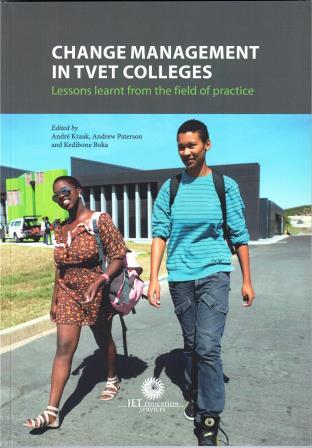
The UNESCO-UNEVOC International Centre: Who We Are | What We Do | Working With Us | Get in Touch
The UNEVOC Network: Learn About the Network | UNEVOC Network Directory
For Members: UNEVOC Centre Dashboard
Thematic Areas: Inclusion and Youth | Digital Transformation | Private Sector Engagement | SDGs and Greening TVET
Our Key Programmes & Projects: BILT: Bridging Innovation and Learning in TVET | Building TVET resilience | TVET Leadership Programme | WYSD: World Youth Skills Day
Past Activities: COVID-19 response | i-hubs project | TVET Global Forums | Virtual Conferences | YEM Knowledge Portal
Our Services & Resources: Publications | TVET Forum | TVET Country Profiles | TVETipedia Glossary | Innovative and Promising Practices | Toolkits for TVET Providers | Entrepreneurial Learning Guide
Events: Major TVET Events | UNEVOC Network News

| Author/s: | André Kraak, Andrew Paterson and Kedibone Boka (eds.) |
| Publisher/s: | Jet Education Services |
| Published: | 2016 in South Africa |
| Licence: | CC BY |
The Technical and Vocational Education and Training (TVET) colleges environment is marked by increasingly stark juxtapositions between what needs to be achieved in the post-school education sector and the increasing difficulty of current conditions. The ‘triple challenge’ of poverty, inequality and unemployment’ weighs heavily on the social, political and economic fabric of the country and expectations are high that the TVET colleges can make a pivotal contribution to counter these challenges
There is huge pressure to accommodate enrolment in colleges. In 2014, 71.3% of all unemployed people in South Africa were in the youth age group from 15 to 34 that is the biggest source of demand for post-school education. This amounts to more than 3.7 million people.
The TVET colleges are in a phase of unprecedented enrolment growth. Head count students numbers have risen from 325 000 in 2010 to 725 000 in 2015 and with a further substantial increase to 1 200 000 mooted by 2019. These figures are highly impressive as they stand.
Despite laudable increases in TVET enrolment, the education system needs to work harder to accommodate weight of demand for post school FET band qualifications from young people not in education, employment or training. At the same time it is vital to secure adequate quality in TVET programs which depend so much on the competence and commitment of college lecturers.
This collection introduces the following papers: